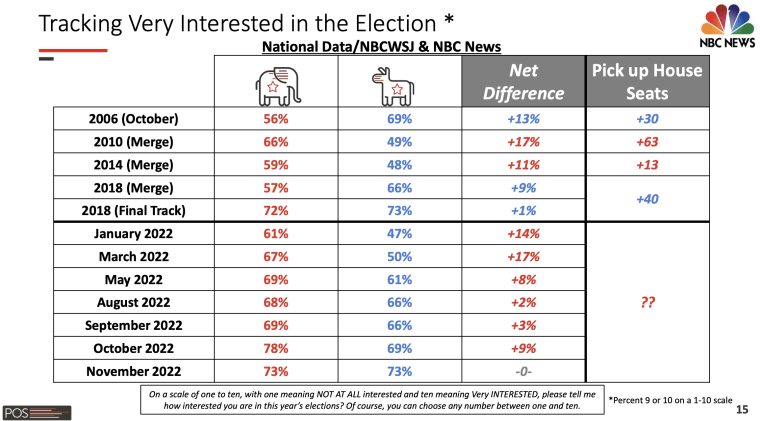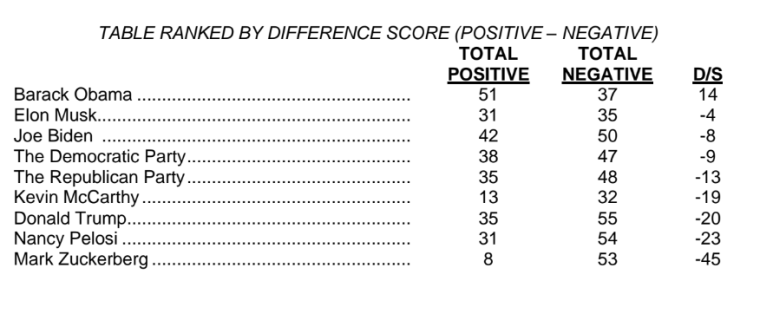Abortion and Trump altered the political landscape in one year
Trump #Trump

WASHINGTON — If it’s Friday … The GOP needs to win seven of 27 uncalled House races for a majority; Democrats need 21. … In Arizona Senate, Democratic Sen. Mark Kelly is ahead of Republican Blake Masters by 115,000 votes with 80% in. … In Nevada Senate, Republican Adam Laxalt leads by just shy of 9,000 votes with 88% in. … The first TV ad of the Georgia Senate runoff is already on the air.. NBC News projects midterm turnout at 112.5 million — down slightly from record 2018 election. … Donald Trump lashes out at Ron DeSantis. … And Gen Z’s first elected member of Congress, Maxwell Frost, gets a shoutout at The 1975 concert in DC.
But first: Two pivotal events took place between Nov. 2021 (when Republicans won statewide in Virginia and almost won in New Jersey) and Nov. 2022 (when the GOP wave fizzled out): The Dobbs decision and Donald Trump’s reappearance as the GOP’s unquestioned leader.
On Dobbs, the national exit poll showed 27% of voters picking abortion as their No. 1 issue (just behind inflation at 31%), and those voters backed Democratic candidates by a 76%-23% margin.
What’s more, 59% said abortion should be legal in all or most cases, versus 36% who said it should be illegal in all or most cases.
And as our NBC News poll showed, Democratic enthusiasm soared after the May leak of the Dobbs decision.

On Trump, remember those 2021 contests in Virginia and New Jersey occurred before more than 200 Trump endorsees had won their primaries; before the GOP had nominated nearly 260 election deniers for House, Senate and governor; and before Trump closed out the 2022 midterms teasing a 2024 presidential bid.
Also remember that Trump never held an in-person rally for Glenn Youngkin in Virginia.
And remember that our final NBC News poll found Trump as one of the most unpopular political figures we measured, especially compared with President Biden.

One additional point we made throughout the cycle: With Trump as its unquestioned leader, Republicans had a difficult time offering something new to voters after losing the White House and Senate.
Glenn Youngkin was something new in 2021 (at least compared with Terry McAuliffe), but the mostly Trump-led GOP was hardly new a year later.
Tweet of the day Data Download: The number of the day is … 5
That’s how many Democratic nominees for secretary of state earned more votes than the Democratic gubernatorial nominees at the top of their tickets.
That’s the case in Nevada, Arizona, New Mexico, Minnesota and Michigan, according to the ballots counted in those states so far. In each state, those Democratic secretaries of state nominees were running against Republicans who cast doubt on the 2020 election result.
As of 7:00 a.m. ET, Secretary of State nominee Cisco Aguilar leads Nevada Gov. Steve Sisolak by 12,847 votes. In Arizona, Secretary of State nominee Adrian Fontes leads gubernatorial nominee Katie Hobbs by 28,106. In Michigan, Secretary of State Jocelyn Benson is projected to win her race and currently has more than 33,135 more votes than Gov. Gretchen Whitmer. In New Mexico, Secretary of State Maggie Toulouse Oliver is projected to win and now sits at 12,807 more votes than Gov. Michelle Lujan Grisham. And, in Minnesota, Secretary of State Steve Simon, who is projected to win his race, has 33,484 more votes than Gov. Tim Walz (who is also projected to win).
Read more on the Meet the Press Blog.
Other numbers to know:
220-215: That’s the current estimate for the House margin in favor of Republicans, per the NBC News Decision Desk. But that estimate comes with a +/- 7 seat margin of error, so it’s unclear which party will control the House after all the votes are counted.
$266,000: That’s how much the National Republican Senatorial Committee spent on a TV buy in the Georgia Senate runoff, per AdImpact. On Thursday the committee launched its first TV ad of the race.
$7 million: How much the Democratic Senatorial Campaign Committee plans to spend on field organizing for the Senate runoff, per a press release. In a memo released Thursday, Warnock’s campaign cited field organizing and “strategic investments in paid communication” as key to a runoff victory.
12: The number of women who will serve as governor in 2023, more than any other time in history. The NBC News Decision Desk has already projected winners in 10 of those races, with Arizona and Oregon still left uncalled (the top vote getters in both races are women).
3: The number of states legislative chambers Democrats are poised to flip, per the National Conference of State Legislatures, with flips still possible in Arizona and New Hampshire depending on final tallies.
5: The number of states where Republicans expanded their ranks to capture a supermajority of at least one legislative chamber, per the NCSL and NBC News’ Phil McCausland.
$473 million: How much more conspiracy theorist and commentator Alex Jones and his company must pay in punitive damages to families of the victims of the Sandy Hook massacre over promoting the falsehood that the 2012 school shooting was a hoax. That’s on top of the $965 million he was ordered to pay last month.
Midterm roundup: The uncalled House races
More than two dozen House races have not yet been called by the NBC News Decision Desk, and the battle for the majority is coming down to a race-by-race fight.
But Democrats still face an uphill climb to get to the 218 seats needed for a majority. They have to win 21 of the 27 uncalled seats, while Republicans just have to win seven. Democrats are currently leading in 16 of the uncalled races, while Republicans are leading in 11.
Here’s the list of uncalled House races from the NBC News Decision Desk that we shared yesterday, with the latest updates and calls as of 7:00 a.m. ET:
Toss up House races, per the Cook Political Report with Amy Walter (12):
AZ-1: GOP Rep. David Schweikert vs. Democrat Jevin Hodge
CA-13: An open seat race with Republican John Duarte vs. Democrat Adam Gray
CA-22: GOP Rep. David Valadao vs. Democrat Rudy Salas
CA-27: GOP Rep. Mike Garcia vs. Democrat Christie Smith
CA-47: Democratic Rep. Katie Porter vs. Republican Scott Baugh
CA-49: Democratic Rep. Mike Levin vs. Republican Bryan Maryott
CO-8: A new seat, featuring Democrat Yadira Caraveo vs. Republican Barb Kirkmeyer
CT-5: Democratic Rep. Jahana Hayes vs. Republican George Logan (NBC called it for Democrat Hayes)
ME-2: Democratic Rep. Jared Golden vs. Republican Bruce Poliquin
NM-2: GOP Rep. Yvette Herrell vs. Democrat Gabriel Vasquez
NV-1: Democratic Rep. Dina Titus vs. Republican Mark Robertson (NBC called it for Democrat Titus)
NV-3: Democratic Rep. Susie Lee vs. Republican April Becker
NY-22: An open seat with Democrat Francis Conole vs. Republican Brandon Williams
OR-6: A new district with Democrat Andrea Salinas vs. Republican Mike Erickson
WA-8: Democratic Rep. Kim Schier vs. Republican Matt Larkin (NBC called it for Democrat Schrier)
Other competitive House races (10):
AK-AL: Democratic Rep. Mary Peltola vs. Republicans Sarah Palin and Nick Begich and Libertarian Chris Bye
AZ-6: An open seat with Republican Juan Ciscomani vs. Democrat Kirsten Engel
CA-3: An open seat with Republican Kevin Kiley vs. Democrat Kermit Jones
CA-9: Democratic Rep. Josh Harder vs. Republican Tom Patti
CA-26: Democratic Rep. Julia Brownley vs. Republican Matt Jacobs
CA-41: GOP Rep. Ken Calvert vs. Democrat Will Rollins
CA-45: GOP Rep. Michelle Steel vs. Democrat Jay Chen
MD-6: Democratic Rep. David Trone vs. Republican Neil Parrot
MT-1: A new seat, with Republican Ryan Zinke vs. Democrat Monica Tranel (NBC called it for Republican Zinke)
NV-4: Democratic Rep. Steven Horsford vs. Republican Sam Peters (NBC called it for Democrat Horsford)
OR-5: An open seat, with Republican Lori Chavez-DeRemer vs. Democrat Jamie McLeod-Skinner
WA-3: An open seat, with Republican Joe Kent vs. Democrat Marie Gluesnekamp Perez
Potential surprise (1):
CO-3: This race wasn’t expected to be competitive, but GOP Rep. Lauren Boebert is in a very close race against Democrat Adam Frisch, with Boebert leading Frisch by just 1,122 votes.
Safe districts (4)
Four Democratic California districts — CA-06, CA-15, CA-21, CA-34 — have not been called. Biden won them by a margin between 18 and 64 points. Two of those five feature Democrat vs. Democrat contests, thanks to the state’s Top 2 primary, so those will stay in the Democratic column.
ICYMI: What else is happening in the world
With his possible majority narrowing and no certainty as to who will control the House, California GOP Rep. Kevin McCarthy’s bid for speaker is in jeopardy.
Virginia’s lieutenant governor, who had been a vocal supporter of then-President Trump’s re-election, declared him a “liability to the mission” and said “voters want to move on.”
Some of the most high-profile Republicans who had previously cast doubt on election results have conceded their own defeats this time with little fanfare.
Sen. Rick Scott, R-Fla., the chair of the National Republican Senatorial Committee, was prepared to take on Sen. Mitch McConnell, R-Ky., in the race for Senate Majority Leader after the midterm elections, but scrapped that plan after Republicans fared worse than expected at the ballot box, Politico reports.